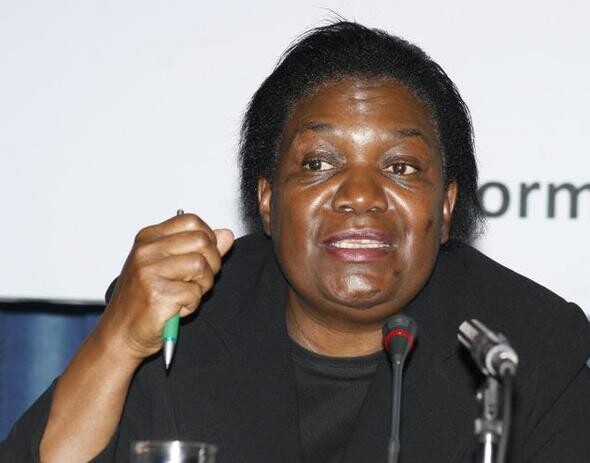hankyoreh
Links to other country sites 다른 나라 사이트 링크
UN special rapporteur criticizes limited freedom of expression in S. Korea

By Choi Yu-bin, staff reporter
A UN human rights special rapporteur expressed a variety of concerns about the human rights situation in South Korea, suggesting that the criminalization of defamation limits the activities of human rights advocates.
Margaret Sekaggya, the UN special rapporteur for human rights defenders, spent two weeks in South Korea assessing the human rights situation in the country. On June 7, shortly before she left the country, she held a press conference at the Koreana Hotel near City Hall in central Seoul to present her initial research findings and to make some recommendations. At the press conference she identified the criminal status of defamation and the National Security Law as major obstacles to defending human rights.
Speaking in regard to Korea’s criminalization of defamation, Sekaggya said that, since defamation is defined as a crime in Article 33 of the criminal code and can be punished with fines and imprisonment, it represents a limitation on the freedom of expression. "This has a chilling effect and leads to self-censorship by certain human rights defenders," she said.
Sekaggya suggested only allowing people to sue for damages due to defamation through the civil code, saying that this is the only way to give vulnerable members of society more options for fighting back against human rights violations. Defamation is not part of the civil code in many countries in Western Europe.
Sekaggya also addressed the National Security Law, saying that human rights advocates who criticize government policies are branded as anti-government organizations. She urged that the law only be applied strictly when there is a clear threat to the state.
Sekaggya also gave low marks to the National Human Rights Commission. “The Human Rights Commission has lost the trust of human rights advocates and a variety of other parties concerned and is failing to play an important role in protecting and promoting human rights,” she said. “The Commission must become more independent and more professional.”
Sekaggya also made a reference to the sit-in protest that is challenging the construction of the electric transmission towers in Miryang, South Gyeongsang Province. She criticized the current system of citizen gatherings needing to be reported to authorities in advance, saying that it is effectively a licensing system that is being used to prevent peaceful gatherings and demonstrations. In addition, she expressed concern about the situation of the media in Korea, mentioning the MBC and YTN reporters who had lost their jobs.
Sekaggya arrived in Korea on May 27 to carry out a fact-finding mission, visiting government agencies including the Police Department, the National Human Rights Commission, and the Korea Communications Standards Commission. She also stopped by the site of the sit-in at the Miryang transmission towers and the aerial sit-in on an electricity pylon at the Hyundai Motor factory in Ulsan.
Sekaggya is planning to compose her final report based on her preliminary findings and present this to the 25th meeting of the UN Human Rights Council, which will take place in Geneva, Switzerland in March 2014.
Please direct questions or comments to [english@hani.co.kr]

Editorial・opinion
![[Editorial] Does Yoon think the Korean public is wrong? [Editorial] Does Yoon think the Korean public is wrong?](https://flexible.img.hani.co.kr/flexible/normal/500/300/imgdb/original/2024/0417/8517133419684774.jpg) [Editorial] Does Yoon think the Korean public is wrong?
[Editorial] Does Yoon think the Korean public is wrong?![[Editorial] As it bolsters its alliance with US, Japan must be accountable for past [Editorial] As it bolsters its alliance with US, Japan must be accountable for past](https://flexible.img.hani.co.kr/flexible/normal/500/300/imgdb/original/2024/0417/6817133413968321.jpg) [Editorial] As it bolsters its alliance with US, Japan must be accountable for past
[Editorial] As it bolsters its alliance with US, Japan must be accountable for past- [Guest essay] Amending the Constitution is Yoon’s key to leaving office in public’s good graces
- [Editorial] 10 years on, lessons of Sewol tragedy must never be forgotten
- [Column] A death blow to Korea’s prosecutor politics
- [Correspondent’s column] The US and the end of Japanese pacifism
- [Guest essay] How Korea turned its trainee doctors into monsters
- [Guest essay] As someone who helped forge Seoul-Moscow ties, their status today troubles me
- [Editorial] Koreans sent a loud and clear message to Yoon
- [Column] In Korea’s midterm elections, it’s time for accountability
Most viewed articles
- 1[Column] The clock is ticking for Korea’s first lady
- 2Samsung barricades office as unionized workers strike for better conditions
- 3[Editorial] When the choice is kids or career, Korea will never overcome birth rate woes
- 4Why Israel isn’t hitting Iran with immediate retaliation
- 5[News analysis] After elections, prosecutorial reform will likely make legislative agenda
- 6[Editorial] Does Yoon think the Korean public is wrong?
- 7S. Korea, Japan reaffirm commitment to strengthening trilateral ties with US
- 8[Editorial] As it bolsters its alliance with US, Japan must be accountable for past
- 9Japan officially says compensation of Korean forced laborers isn’t its responsibility
- 10Faith in the power of memory: Why these teens carry yellow ribbons for Sewol